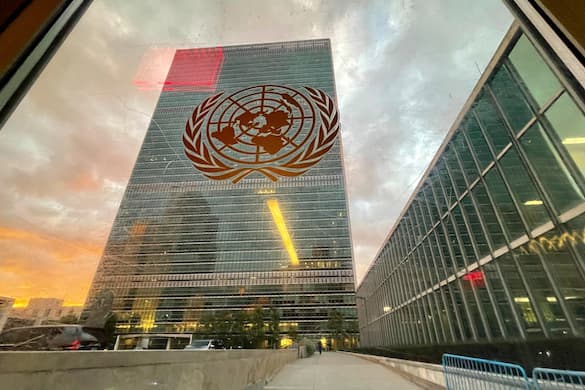Israeli and Jewish Targets Conspicuously Absent as UN Marks Day of Solidarity With Terrorism Victims
‘Memories,’ an exhibition mounted by the UN’s counterterrorism office, includes 14 panels containing pictures and stories of victims and their loved ones but nothing about the Hamas attack of October 7 or any Israeli or Jewish victims around the world.

As the United Nations marks a day of solidarity with victims of acts of terrorism Wednesday, it is studiously avoiding one date when the largest terrorist attack per capita on record occurred: October 7, 2023.
“Memories,” an exhibition mounted by the UN’s counterterrorism office at the organization’s New York headquarters, includes 14 panels containing pictures and stories of victims and their loved ones. Although Israel is besieged by terrorist acts, none of the panels contains any mention of attacks on Israeli or Jewish victims around the world. Nor is October 7 referenced in an official UN statement on the day of solidarity’s commemoration.
On multiple occasions, the UN secretary-general has denounced “the terrorist attacks conducted by Hamas against Israelis on the seventh of October,” his spokesman, Stephane Dujarric, told the Sun. The exhibit was “designed by our colleagues at the Office for Counterterrorism, and was launched in May of 2022.” It has been mounted since then in various places around the world, he added.
Even so, the UN terror fighters must have missed pre-2022 events such as the attack on Israeli athletes at the 1972 Munich Olympics; waves of plane hijackings culminating in the 1976 rescue at Entebbe; and numerous attacks against Israeli civilians, such as the bus bombing campaign in the late 1990s and early 2000s.
Attacks against Israelis and Jews abroad included the 1994 bombing of the Jewish center at Buenos Aires, the 2012 bus bombing at Burgas, Bulgaria, and numerous others. None of those are referenced in that 2022 UN exhibit. One of its panels is, however, dedicated to Maysoon Salama of the state of “Palestine.” Her son, Atta Elayyan, was killed in a 2019 terror attack on a mosque at Christchurch, New Zealand.
Is the absence of Israeli and Jewish terror victims accidental, or is there a pattern — excluding one group from the UN’s attention while highlighting others?
“The Office of Counterterrorism is focused on supporting all victims of terrorism, all survivors of terrorism,” Mr. Dujarric insists, adding that Secretary-General Guterres has met with families of Israeli hostages held in Gaza since October 7 “more than a dozen times, if not two dozen times.”
Yet, neither the UN General Assembly nor the Security Council managed to include groups that constantly target Israeli civilians — Hamas, the Palestinian Islamic Jihad, Hezbollah, and others — in a list of designated terrorists.
The counterterrorism office’s list includes four dozen organizations, all affiliated with either al Qaeda or ISIS. These two extreme Islamist groups were named in several Security Council resolutions since the September 11, 2001, attacks at New York, Pennsylvania, and Washington, D.C.
Yet, “the Security Council couldn’t manage such a resolution on what happened to us on October 7,” the Israeli ambassador at the UN, Danny Danon, tells the Sun. “There is much terror-related talk at the UN, except when it comes to Israel.”
Mr. Danon spoke while preparing a protest letter to Mr. Guterres and the Security Council. “This is a stain on the organization, and not only because of that exhibition. As long as the UN doesn’t declare Hamas a terrorist organization, this day remains utterly meaningless,” he writes on X.
But what is terrorism? The FBI, for one, defines it as “the unlawful use of force and violence against persons or property to intimidate or coerce a government, the civilian population, or any segment thereof, in furtherance of political or social objectives.”
Since the 1970s, however, the UN has failed to adopt a similar one paragraph line. At Turtle Bay, the concept of terrorism remains elusive, as UN members struggle to coalesce around an agreed definition.
Specifically, Arab and Muslim countries consistently demand to exclude “acts against foreign occupation” from any definition of terrorism. That means any attack on Israeli “persons or property” gets the UN’s green light.
In 2023, Burkina Faso, population 22.5 million, topped a global list of terror victims compiled by a British outfit, “Vision of Humanity.” Israel, with its just more than 9 million citizens, was in second place, far ahead of larger countries like Mali, Pakistan, and war-torn Syria.
Adjusted to population size, October 7 was the largest terror attack since data started being gathered in the 1970s, according to the Center for Strategic and International Studies. Only the 9/11 attack, when 2,996 Americans were killed, and a 2014 attack at Tigris, Iraq, where 1,700 people perished, exacted more casualties than the 1,200 Israelis killed by Hamas in one day.
“No one can deny October 7 was terrorism,” Mr. Danon says. “Even Hamas isn’t denying it. They proudly say they’ll do it again and again.” Yet the UN, including its only body charged with tracking terrorism, ignores that seminal event while it commemorates terror victims.

